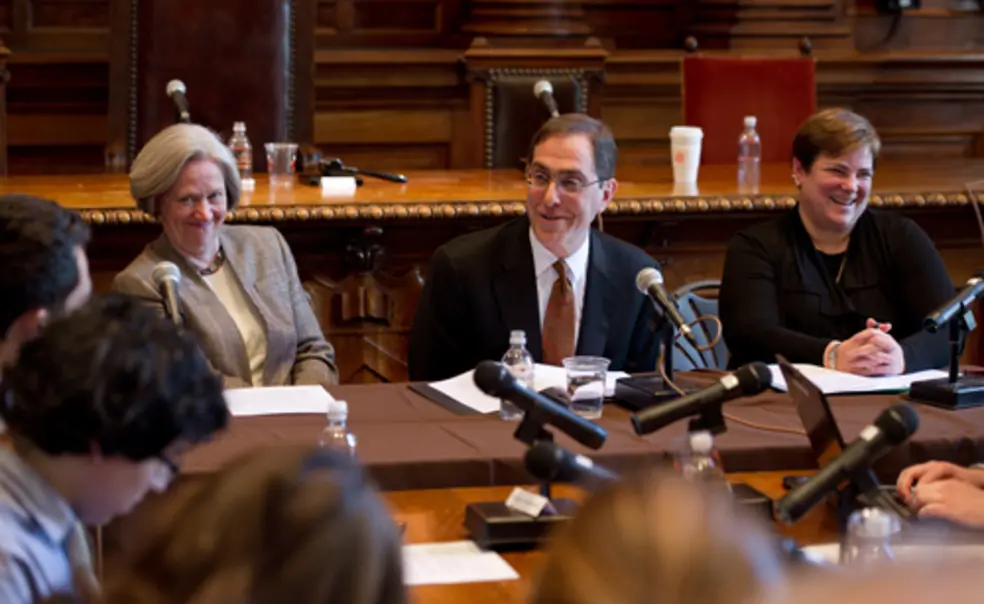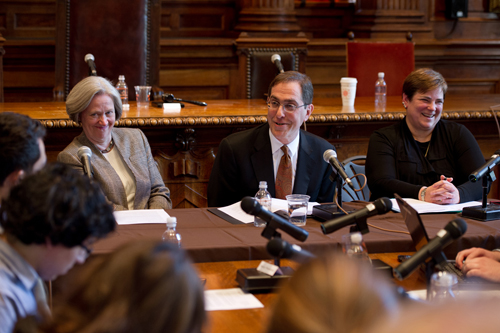Princeton's next president
On April 21, the University’s Board of Trustees voted unanimously to select Provost Christopher Eisgruber ’83 as Princeton’s 20th president. Eisgruber sat down with PAW shortly after the announcement to discuss his new post and share some preliminary thoughts about the University and the course on which he hopes to lead it. Here are some excerpts from that discussion:
(On succeeding President Tilghman) One of the extraordinary things about Shirley Tilghman … is her genuine respect and regard and affection for members of our staff, our student body, and our alumni community, and I think you see that in the outpouring of love for her. In a community like ours, that matters tremendously.
(On Princeton’s diversity efforts) I do think that sometimes we conflate different things under the word “diversity.” This is an area where we have more to do from the standpoint of inclusivity. There are two trustee committees meeting right now, one focused on questions of inclusivity and underrepresented groups at the faculty, staff, and graduate-student levels. We’ve done well if you look at the numbers or if you simply look out at the campus, with regard to underrepresented groups at the undergraduate level, but we still face challenges elsewhere.
You can always say, we can push harder, but your ability to push harder and be successful is going to depend on what sorts of pools you are drawing from. Any time you look at the pipeline right now, you see it get a whole lot narrower when you get to those graduate schools. Some departments, such as molecular biology, have shown that it is possible to do better.
I think that socioeconomic diversity is a place where we can do better, including in the undergraduate student body. Diversity of thought is sometimes grouped together with these issues that I have just described as inclusivity, but can often be a very different thing. You want robust debate, but that doesn’t mean that you want point-counterpoint: This isn’t a Sunday-morning talk show where we put together one of each variety, and they just shout at one another. But you do need enough challenging of premises going on that you get real diversity of discussion. I think we have that in general at Princeton.
(On areas in which he believes he must get up to speed) I know relatively little about what we do in intercollegiate athletics, and that is a big part of what presidents do. Right now I’m a sports fan, and I am happy to go to the games and cheer on our teams, but I’m going to have to learn more about that. Admissions is another area where I have been relatively uninvolved, and it’s also a part of the president’s job.
(On Princeton’s participation in online learning) Right now, as part of our Coursera project, we’re in partnership with a state flagship university. Some of our lectures are being used there as part of classes which also have an on-site component. If this works well, we may be able to help change the cost curve at institutions that are facing a lot of pressure, while helping them sustain the quality of what they do. I think it would be a mistake if we, as a country, start heading down a path where we are making education less expensive by making it less good. Good education matters, but if there are ways that we can keep education equally good or even better while making it less expensive, that is something that is important for Princeton and it’s important for higher education.
(On areas where Princeton should devote more research attention) I think one area where we do well, but I would hope to see us devote more attention, is the area of regional studies. This is another part of internationalization. We have terrific people already in regional studies, but if you look at where there is student demand and where it is very important that we as universities make a contribution and train the next group of scholars, that is one area where there are a lot of challenges. To do it well, generally, you need to know a region and you need to know a discipline, and they aren’t necessarily the same thing.
This is an area where you cannot cover everything. One of the things we always say at Princeton is, we’re a great university and we are a small university. We need to pick our spots, metaphorically. Here we may need to pick our spots less metaphorically, but here is an area where I do think that building capacity is important.
(On the University’s globalization efforts) For us at Princeton, this is all about people and engagement. … This is about impact — about the impact that our students have as they move out into the world. How do we equip them to be global citizens? Are we addressing research that matters, not just in the United States but in the world? There are times when other universities approach this in ways that look like they are looking for ways to raise additional funds or increase market share. That is not what Princeton has ever been interested in.
(On the president’s role in speaking out on higher-education issues) That’s very important. We’re at an odd stage in our history. On one hand, people prize liberal arts education. You can see it when you look out the window at Clio Hall and watch the groups of students come through [who want ] to go to Princeton. On the other hand, you have people wondering, in the newspaper at least, whether liberal arts education is worthwhile. One of the things I have had a chance to do over the last three or four years is to start to get more involved with policy task forces in Washington, with the AAU [Association of American Universities], for example, on these issues, both trying to get a sense of how we get our message out about what we do and what the value of our education is, and also how do we respond to some of the concerns that people have about what we are doing. Speaking out is going to be a matter of those two things: one, understanding how to deliver our message in a way that gets it across and, secondly, showing that we really hear the concerns that people are expressing.
(On the debate about measuring a college education's value) We have been working with some of our peer institutions and other partners to formulate a way of describing how we care about student achievement. ... I think some of the ways of talking about outcomes [in higher education] are counterproductive. I don’t think a standardized-test score is an outcome of liberal arts education. It’s an artificial measurement. But how much somebody engages in civic service after they go through a liberal arts education – that does matter.
We’re also going to have to get better about collecting and sharing data. There’s a lot of data that we collect right now that we don’t share. We will have to answer some questions about our data sometimes, but I think we’re better off having that conversation than saying, “We’ve got the data, everything is OK, trust us.”
(On the campus today, compared with his time as an undergraduate) Oh my goodness, I would love to be an undergraduate today! … When I look back at my Princeton experience from 1979 to 1983, I didn’t have any experiences like [the freshman-seminar program] that were designed to put you in close contact as a freshman in a really comfortable way with faculty members who could serve as your mentors all the way through. Then there are things like the study-abroad experiences. I think all of us would be ready to sign up. And I think the combination of inclusivity and access – we have made important strides in that regard.
I graduated with more debt when I came out of the University than our average student loan now for students who carry debt. This clearly has made a difference for our students.
(On the perspective of having been an undergraduate at Princeton) It certainly gives me a heartfelt appreciation and love for the place, but on the other hand, you had three presidents between me and Robert Goheen who have shared that love. If you look at Bill Bowen [*58], Harold Shapiro [*64], and Shirley Tilghman, they are Princetonians through and through. I’m inclined to say that my Princeton experience gives me a special connection to the place, but if I look at these predecessors, it’s hard for me to imagine anyone caring more about it than they have done.
(On something about him that might be surprising) I don’t know if this is that surprising, but I subscribe to Rolling Stone magazine in order to keep in touch with what is happening in the folk-rock scene. It also is occasionally a way to get perspective on college life.
(Last year, Eisgruber and his wife hosted a concert at their house for singer Sarah Borges, whose music has been described by one website as “walking that fine line between punk and country.” He also is a fan of English singer and songwriter Jake Bugg.)
Interview conducted and condensed by Marilyn Marks *86, W. Raymond Ollwerther ’71, and Mark F. Bernstein ’83. For more coverage of Eisgruber’s selection, see the May 15 issue of PAW.













No responses yet